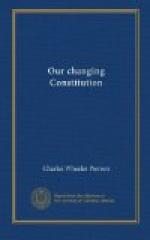In a series of later cases various reconstruction acts of Congress involving encroachments upon state rights were either held unconstitutional or radically limited in their effect. For example, the decision in United States v. Cruikshank[1] greatly limited the effect of the so-called Federal Enforcement Act. The decision in United States v. Harris[2] declared unconstitutional portions of an act of Congress designed for the suppression of activities of the Ku-Klux variety. In the so-called Civil Rights cases[3] certain provisions of the federal Civil Rights Act, passed in furtherance of the purposes of the new constitutional amendments and designed to secure to persons of color equal enjoyment of the privileges of inns, public conveyances, theatres, etc., were held unconstitutional as an encroachment on the rights of the states.
[Footnote 1: 92 U.S., 542 (1875).]
[Footnote 2: 106 U.S., 629.]
[Footnote 3: 109 U.S., 3.]
These are but a few of the many decisions of the Supreme Court in the reconstruction period upholding the rights of the states against attempted federal encroachment arising from the conditions of the Civil War. The nation owes a debt of gratitude to the men who composed the Court at this time for their courage and firmness in the face of popular clamor and passion.
The solicitude of the Court for the rights of the states did not end with the reconstruction period. It has continued down to the present day. In the Income Tax cases[1] the Court held that a tax upon income from bonds of a state municipal corporation was repugnant to the Constitution as a tax upon the borrowing power of the state.
[Footnote 1: Pollock v. Farmers Loan & Trust Co., 157 U.S., 429 (1895).]
In Keller v. United States[1] the Court declared unconstitutional, as an encroachment on the police power of the states, an act of Congress making it a felony to harbor alien prostitutes, the Court declaring that “speaking generally, the police power is reserved to the states and there is no grant thereof to Congress in the Constitution.”
[Footnote 1: 213 U.S., 138 (1909).]
In the Child Labor case[1] the Court held the federal Child Labor Law of 1916 unconstitutional as invading the police power reserved to the states. The Court said:
This Court has no more important function than that which devolves upon it the obligation to preserve inviolate the constitutional limitations upon the exercise of authority, federal and state, to the end that each may continue to discharge, harmoniously with the other, the duties entrusted to it by the Constitution.[2]
[Footnote 1: Hammer v. Dagenhart, 247 U.S., 251 (1918).]
[Footnote 2: An even stronger assertion of state rights is found in the Child Labor Tax Case (Bailey v. The Drexel Furniture Co.) decided May 15, 1922, after this chapter had been put into print.]




